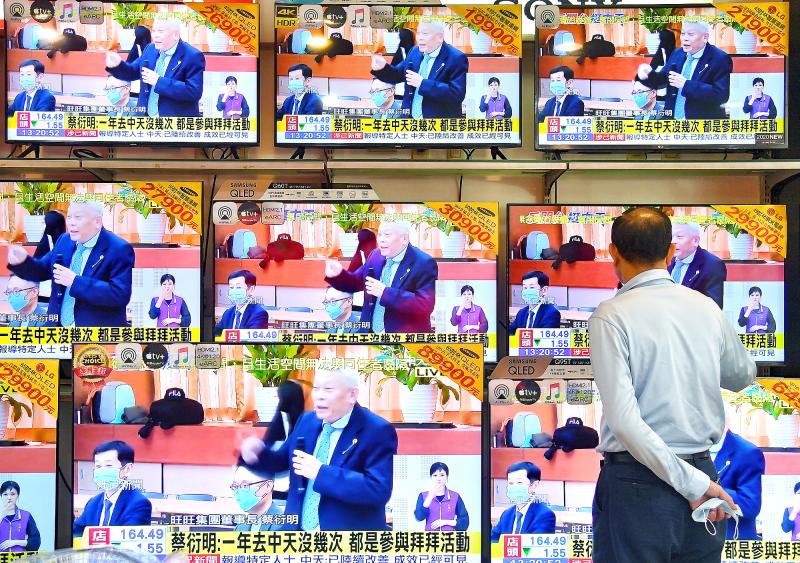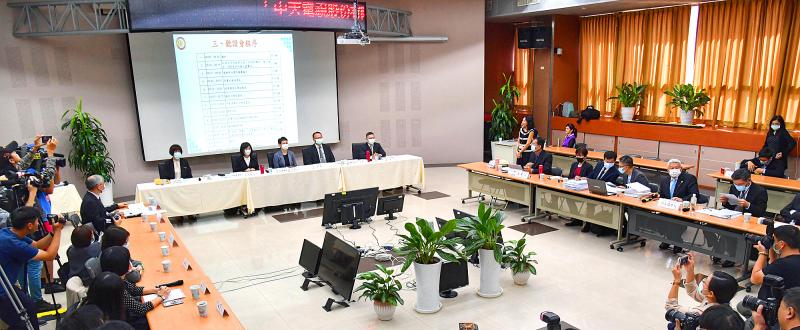Want Want China Times Media Group (旺旺中時集團) founder Tsai Eng-meng (蔡衍明) yesterday told an administrative hearing that he does not interfere in the daily operations of CTi News, and that he had come to the meeting to defend the dignity and the survival of the people working at the news channel.
The hearing was organized by the National Communications Commission (NCC) as part of its review of the news channel’s application to renew its operating license, which is set to expire at the end of this year.
During the eight-and-a-half-hour hearing that began at 9:30am, Tsai, also the chairman of San Want Holding Ltd (神旺投資), which owns 75 percent of CTi News, did not speak until he was called to answer questions from NCC commissioners Wang Wei-ching (王維菁) and Lin Lih-yun (林麗雲) at about 1pm.

Photo: CNA
Asked how he communicated with the media group’s management while ensuring that they carry out his ideals of “truth and reason, and an authentic love for Taiwan,” Tsai said he only visits the offices of CTi News and the Chinese-language China Times two or three times a year to join company employees in praying to the gods during Ghost Festival and other events.
He denied that he was there to instruct them how to write news reports, adding that management did not always listen to him anyway.
Tsai said that many people tried to dissuade him from attending the hearing after he was targeted in a hearing on Want Want China Times’ bid to acquire China Network Systems (中嘉網路), the nation’s second-largest multiple systems operator, in 2012.

Photo: CNA
Unlike the public hearing in 2012, where he looked impatient and irritated at times when answering questions from NCC commissioners, Tsai appeared more amicable yesterday and even apologized to the commissioners if what he said had offended them.
Asked about the subsidies that Want Want China Holdings Ltd (中國旺旺控股), of which he is chairman, received from the Chinese government in the past 11 years, Tsai said they were available to all companies in China, including those from the US and Japan.
Want Want China Holdings is a publicly traded firm in Hong Kong, and subsidies were not granted to him alone, he said.
Tsai said Want Want China Times is his personal investment, but he has been repeatedly and unjustifiably humiliated for it in the past 10 years.
“I grew up in Taiwan and built a business in China. Both are my hometown. All I hoped for is be a platform for cross-strait communication,” he said, adding that he wondered what he had done to make people think he had betrayed Taiwan.
Tsai said he was saddened to learn that China Times’ reporters are despised by their peers because many young people think badly of him.
All he wants is for people in Taiwan to live a good life, he said.
Tsai’s attorney, Fang Po-hsun (方伯勳), raised procedural issues several times during the hearing and asked to question NCC officials, expert witnesses and CTi News’ ombudsman.
NCC Commissioner Hsiao Chi-hung (蕭祈宏) only agreed to extend the time for his opening presentation from 25 minutes to 30 minutes, and allowed him access to expert witnesses’ reports and to question them and the ombudsman, but denied his other requests.
Fang said that CTi News secured a passing grade in the review of its performance from 2014 to 2017.
Five of the channel’s 21 contraventions of media regulations in the past six years are being disputed in the administrative court, he said, adding that the NCC should not reject its license renewal application based on unsettled cases.
The channel is being punished for its political news coverage because it had received the most complaints from viewers, but this is only a reflection of the political inclination of the public, rather than the quality of its news reports, he said.
Expert witnesses unanimously criticized the performance of CTi News, with two of them urging the NCC not to renew its license.
Aside from mishandling news reports about the channel itself, it allocated a disproportionately high percentage of its reports to former Kaohsiung mayor Han Kuo-yu (韓國瑜) of the Chinese Nationalist Party (KMT) when he was running for the post in 2018, they said.
One of them said that the amount of fines accumulated in the past six years are evidence that the news channel’s internal quality control mechanism had failed.
CTi News is the only channel in the country that did not report on the democratic uprising in Hong Kong and Beijing’s persecution of Uighurs, they said, adding that it lacks diversity in content.
Liang Tien-hsia (梁天俠), who has been the chief director of the channel’s news department since March, said that the fines date back to before she took charge of the newsroom.
CTi News would not devote an excessive amount of airtime to coverage of specific politicians with her at the helm, she added.

CHIP WAR: The new restrictions are expected to cut off China’s access to Taiwan’s technologies, materials and equipment essential to building AI semiconductors Taiwan has blacklisted Huawei Technologies Co (華為) and Semiconductor Manufacturing International Corp (SMIC, 中芯), dealing another major blow to the two companies spearheading China’s efforts to develop cutting-edge artificial intelligence (AI) chip technologies. The Ministry of Economic Affairs’ International Trade Administration has included Huawei, SMIC and several of their subsidiaries in an update of its so-called strategic high-tech commodities entity list, the latest version on its Web site showed on Saturday. It did not publicly announce the change. Other entities on the list include organizations such as the Taliban and al-Qaeda, as well as companies in China, Iran and elsewhere. Local companies need

LONG FLIGHT: The jets would be flown by US pilots, with Taiwanese copilots in the two-seat F-16D variant to help familiarize them with the aircraft, the source said The US is expected to fly 10 Lockheed Martin F-16C/D Block 70/72 jets to Taiwan over the coming months to fulfill a long-awaited order of 66 aircraft, a defense official said yesterday. Word that the first batch of the jets would be delivered soon was welcome news to Taiwan, which has become concerned about delays in the delivery of US arms amid rising military tensions with China. Speaking on condition of anonymity, the official said the initial tranche of the nation’s F-16s are rolling off assembly lines in the US and would be flown under their own power to Taiwan by way

CRITICISM: It is generally accepted that the Straits Forum is a CCP ‘united front’ platform, and anyone attending should maintain Taiwan’s dignity, the council said The Mainland Affairs Council (MAC) yesterday said it deeply regrets that former president Ma Ying-jeou (馬英九) echoed the Chinese Communist Party’s (CCP) “one China” principle and “united front” tactics by telling the Straits Forum that Taiwanese yearn for both sides of the Taiwan Strait to move toward “peace” and “integration.” The 17th annual Straits Forum yesterday opened in Xiamen, China, and while the Chinese Nationalist Party’s (KMT) local government heads were absent for the first time in 17 years, Ma attended the forum as “former KMT chairperson” and met with Chinese People’s Political Consultative Conference Chairman Wang Huning (王滬寧). Wang

CROSS-STRAIT: The MAC said it barred the Chinese officials from attending an event, because they failed to provide guarantees that Taiwan would be treated with respect The Mainland Affairs Council (MAC) on Friday night defended its decision to bar Chinese officials and tourism representatives from attending a tourism event in Taipei next month, citing the unsafe conditions for Taiwanese in China. The Taipei International Summer Travel Expo, organized by the Taiwan Tourism Exchange Association, is to run from July 18 to 21. China’s Taiwan Affairs Office spokeswoman Zhu Fenglian (朱鳳蓮) on Friday said that representatives from China’s travel industry were excluded from the expo. The Democratic Progressive Party government is obstructing cross-strait tourism exchange in a vain attempt to ignore the mainstream support for peaceful development